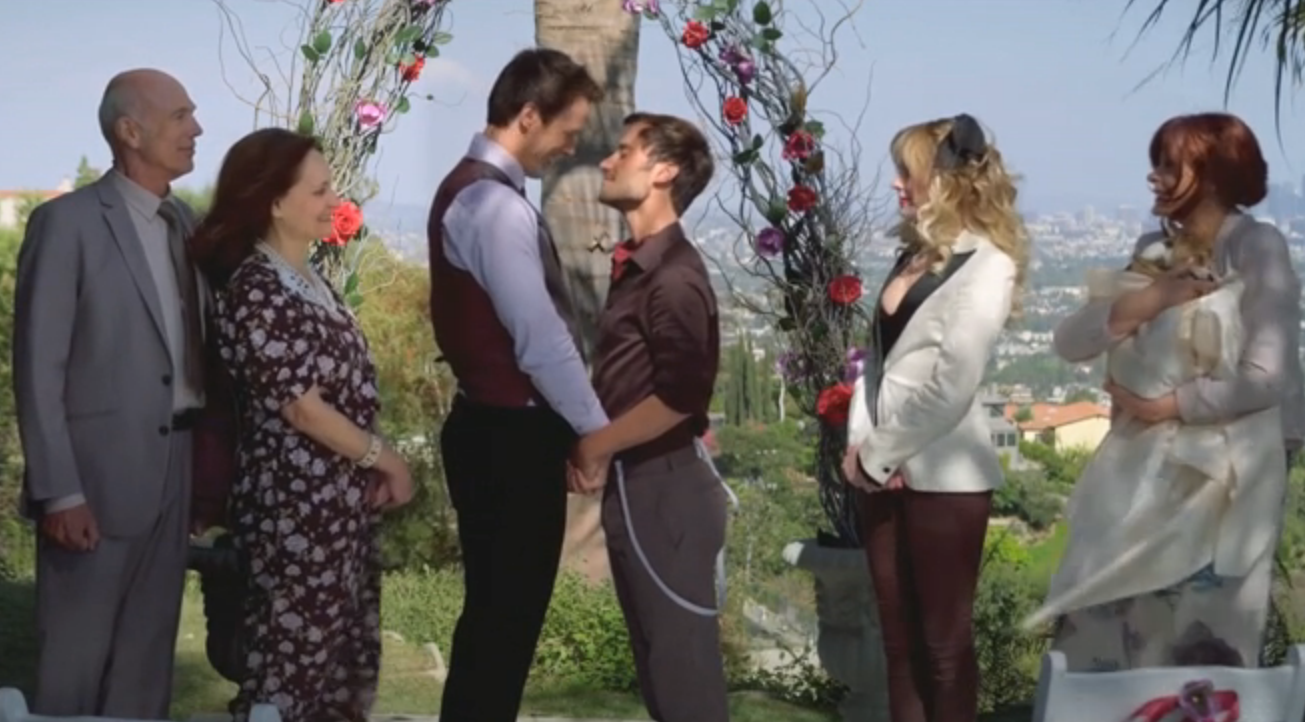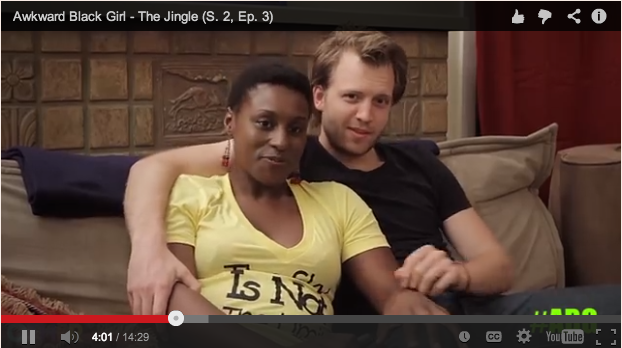
In the digital age, there are many paths to creating great content. On the web, creators have the autonomy to write and produce what they want, when they want, and with whomever they choose. This openness has allowed for characters whose stories we might have otherwise missed.
One of the pioneers of this method of storytelling is Brad Bell, the creator of the YouTube personality “Cheeks”—a character he later developed into the web series Husbands with prolific TV producer Jane Espensen. We chatted with Brad (he’s a real smartypants) ahead of his visit to TH5 on April 4 for our panel, “Indie TV: Where Creators and Fans Pilot New Shows.”
What inspired you to take Cheeks and develop a series for him outside the traditional model? What was that process like?
Cheeks was initially a satirical vehicle to express whatever pop culture commentary that struck me. Basically, it was the only conscious through line of my varied creative experiments. But the more I wrote and performed as Cheeks, a fully formed character took shape and, before long, it felt like Cheeks needed to go beyond the confines of the YouTube video window. Then, when Jane and I were first brainstorming Husbands, we envisioned an Odd Couple dynamic, so it just made sense for (and I’m mixing my sitcom analogies, here) Cheeks to be the Dharma to Brady’s Greg.
As far as making Husbands outside of the traditional model, I’ve never been much of a traditionalist. (Shocking, right?) My favorite sitcoms are those which use humor to challenge the status quo, and have discussions about gender politics or double standards or social mores. Shows like All in the Family, Mary Tyler Moore, Soap, and South Park. Even I Love Lucy was more subversive than you might realize. (See Episode 36, “Job Switching.”) We wanted to continue that tradition of TV with Husbands, and that style of comedy requires a very precise ratio of camp/realism, silly/cerebral, candy/commentary. Ultimately, I guess Jane and I just trusted ourselves more than anyone else to get that recipe right, and make exactly the kind of show we’d want to watch.
What were some benefits and challenges of forging a new path like you have done with Husbands?
That’s a perfect metaphor —”forging a new path”—to describe the challenges and benefits. Imagine you’re in the jungle, forging said path. You’re cutting vines and toiling for days, smoothing out the uneven Earth little by little. You’re exhausted and dirty, and to top it all off, the speed at which you’re traveling is tedious, because you can’t move forward until you make a path.
Now, compare that to the experience of just walking down an existing path in the jungle. Granted, it’s probable that this path has plenty of deadly predators, and maybe a thick fog that reduces your ability to see more than a few feet ahead, but the work to make the path has already been done. You can focus on putting one foot in front of the other, and give more attention to whatever’s making that rustling in the bushes. However, this path is limiting, because you can only go where it leads you. And sure, this path might be the most direct route to an oasis of unimaginable treasures! Or there might be a shorter route to the same oasis. Or an undiscovered (and even more unimaginable) oasis of treasures awaiting you at the end of a path that no one has yet forged!
Bottom line is, there are infinite possible benefits and challenges because there are an infinite number of possible paths. My strategy is to survey the paths that exist, and walk along them when/if it makes sense to do so. However, if the human bones littering the path start to pile up more as you walk along, be ready to jump into the overgrown forest floor and take your chances.
Do you hope to see Cheeks and Brady on more a traditional platform (i.e., as a series on a network), and if so, what does that say about the value that is still placed on certain platforms over others?
There’s so much to this question! To answer it fully, we need to clarify why there is a higher value placed on content that is perceived to be “legitimate television.” Oddly though, the standards by which people define television isn’t the platform. They just think it is.
For example, Orange is the New Black is a television show, right? I would say yes. But, by platform specifications, it’s a web-series. Why? Because it’s delivered via the Internet, either on your computer, tablet or set-tops boxes and smart TVs. Cable and broadcast (which have actually both been the same platform for years, digital) is a different platform than the one delivering Netflix or YouTube. That begs the question: if Netflix and YouTube are technically delivered by the same system, why is Netflix perceived as TV, while YouTube is a cesspool of skateboarding fails? The two primary reasons are visibility and length.
Let’s start with length. For seventy plus years, the TV viewing public has been fed content with a run time of twenty-two minutes or forty-four minutes, for comedy and drama respectively. TV seasons are anywhere from ten episodes to twenty two episodes—give or take a few, depending on the decade. Interestingly, most award shows (as well as creative unions) determine the classification and qualification of entries (or employment) based on minutes per episode, and the number of episodes produced per season. So, if you’re looking for an empirical answer to “What is television,” then length is your best qualifier.
Now, let’s talk perception. After all, perception determines reality, especially in Hollywood. This is where visibility comes into play. To find House of Cards, you don’t have to weed through endless “crazy card trick” videos on YouTube. It’s presented to you by Netflix on a nice sleek menu, likely on that screen in your living room, and exists among a selection of content you perceive as “real” television. (You’ll notice that, with new media, the goal of visibility has more to do with the psychology of marketing than it does driving viewership.) There are also forty-foot tall billboards for House of Cards, bus ads and fully immersive ads on website home pages. See, in this case, a multi-million dollar advertising budget classifies the content as “legitimate” and “important” in the eyes of the public. Throw in high-quality storytelling and A-List talent, and no one will even notice your show, technically, “isn’t television.”
But of course, it is television. The term web-series is irrelevant, because the platforms are irrelevant. It’s all television now. It’s just a matter of professional television versus amateur hour. The Internet is not “the future of television.” Neither are the two slowly merging. That’s already happened. It’s only the perception of the public that lags behind. My point in saying all this is, I would love to be able to produce Husbands in the volume and frequency that the audience wants, which would be an order of episodes along the lines of a traditional television season. However that happens, or whatever platform it might be on, is less relevant.
What was the impetus for a Husbands graphic novel? Were the things you wanted to do with the characters/world that you felt couldn’t be achieved through the series?
When we wrote the graphic novel, we’d ended the second season, and hadn’t yet met with The CW. There was uncertainty about whether we’d continue the series, so we thought a comic would be a fun way to continue the series in the meantime. Aside from the obvious things that would be too expensive to produce for the show, like exploding meteorites and spaceships, it also gave us a chance to explore familiar gender dynamics, and examine the ways in which those would change—or stay the same—when the roles were filled with two men.
What advice would you give to aspiring creators who would like to follow in your footsteps?
Besides, “Pick someone better to follow?” Hmm. I’d say, if you want to follow in my footsteps, study what I do. Then find a way to do it better.
Apart from Husbands, anything you can share about other projects you’re developing? More web series? Graphic novels?
Eek! Tough question to answer because, yes, I’m developing a few projects, but nothing I can talk about yet, unfortunately. Although, while I’m really excited about what I’m working on during the present Husbands hiatus, what I’d most love to do next is make more Husbands. (For many, many years to come!)
—
You can watch Husbands on CW Seed.




